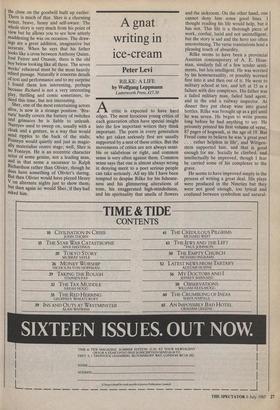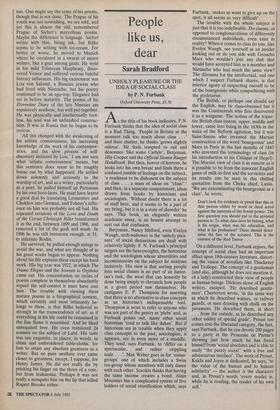A gnat
writing in ice-cream
Peter Levi
RILKE: A LIFE by Wolfgang Leppmann
Lutterworth Press, £17.50
Acritic is expected to have hard edges. The most ferocious young critics of each generation often have special insight into the few important writers they think important. The poets in every generation who get taken seriously first are usually supported by a nest of these critics. But the movements of critics are not always sensi- ble or salubrious or right, and common sense is very often against them. Common sense says that one is almost always wrong in denying merit to a poet serious people can take seriously. All my life I have been tempted to despise Rilke for his fulsome- ness and his glimmering alterations of tone, his exaggerated high-mindedness, and his spirituality that smells of flowers
and the sickroom. On the other hand, one cannot deny him some good lines. I thought reading his life would help, but it has not. This life is a thorough piece of work, cordial, lucid and not unintelligent, but the story is sad and the hero too often unconvincing. The verse translations lend a pleasing touch of absurdity.
Rilke seems to have been a provincial Austrian contemporary of A. E. Hous- man, similarly full of a few tender senti- ments, but less intelligent. He was worried by his homosexuality, or possibly worried first into it and then out of it. He went to military school at ten, and left at 15 as a failure with dire complexes. His father was a failed military man, failed land agent, and in the end a railway inspector. At dinner they put cheap wine into grand bottles. Rilke was brought up as a girl until he was seven. He began to write poems long before he had anything to say. He privately printed his first volume of verse, 87 pages of hogwash, at the age of 19. But Freud came to believe he was 'a great poet . . rather helpless in life', and Wittgen- stein supported him, and that is good enough for me. Socially he climbed, and intellectually he improved, though I fear he carried some of his complexes to the grave.
He seems to have improved simply in the process of writing a great deal. His plays were produced in the Nineties but they were not good enough, too lyrical and confused between symbolism and natural- ism. One might say the same of his poems, though that is not done. The Prague of his youth was not nourishing, we are told, and yet this is almost the old, remembered Prague of Siefert's marvellous poems.
Maybe the difference is language. Siefert writes with thin, biting ink, but Rilke seems to be writing with ice-cream. For better or worse, he moved to Munich where he circulated in a swarm of minor writers, like a gnat among gnats. He went in for mild Tolstoyan blasphemy, disco- vered Venice and suffered various baleful literary influences. His big excitement was Lou von Salome, a Russian jewess who had lived with Nietzsche, but his poetry continued to be an ego-trip. Elegance had set in before maturity. The poems of his Florentine Diary of the late Nineties are repulsively aesthetic, but well put together. He was physically, and intellectually root- less, his soul was an unfinished construc- tion. It was in Russia that he began to be serious.
'All this changed with the awakening of his artistic consciousness, his increasing knowledge of the work of his contempor- aries, and the slow process of self- discovery initiated by Lou.' I am not sure what 'artistic consciousness' means, but this sentence does seem to be roughly borne out by what happened. He settled down solemnly and seriously to the worship of art, and as a writer, particularly as a poet, he pulled himself up Parnassus by his own boot-laces. He must have learnt a good deal by translating Lermontov and Chekhov into German, and Tolstoy's influ- ence on him was probably not all bad. His repeated revisions of the Love and Death of the Cornet Chri,stoph Rilke transformed it in the end, between 1899 and 1906, and removed a lot of the gush and mush. In 1906 he was still immature enough, at 31, to infuriate Rodin.
He survived, he pulled enough strings to avoid the war, and what are thought of as his great works began to appear. Nothing about his life explains them except his hard work. His big year was 1922, in which The Duino Elegies and the Sonnets to Orpheus came out. His concentration on cycles of poems complete in themselves abundantly repaid the self-control it must have cost him. The trouble with viewing these mature poems in a biographical context, which certainly and most intimately be- longs to them, is that Rilke believed so strongly in the transcendence of art: as if everything in his life could be consumed in the fine flame it nourished. And he liked unrequited love. He even translated 24 sonnets on the subject of Labe. His taste was too exquisite, in places, in words, in china and embroidered table-cloths, for him to attain any absolute greatness as a writer. But no pure aesthete ever came closer to greatness, except, I suppose, for Henry James. He did not really die by pricking his finger on the thorn of a rose, but from leukaemia. Perhaps it was not really a mosquito bite on the lip that killed Rupert Brooke either.



















































 Previous page
Previous page